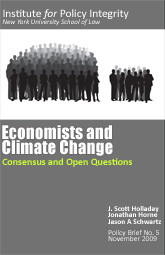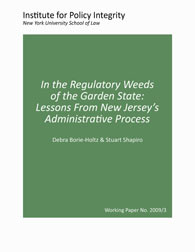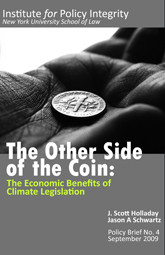-
Fact sheet on cap-and-refund costs
A cap-and-refund approach to climate change will require that all households be transferred their portion of the proceeds from the auction of carbon allowances in a timely and cost effective manner. Policy Integrity conducted analysis of the refund can be administered and released a fact sheet finding that the cost of getting the refund to American individuals and families will be relatively modest.
-

Economists and Climate Change
Consensus and Open Questions
Economists and Climate Change: Consensus and Open Questions describes and analyzes the results of a survey sent to 289 economic experts on climate change. Over 84% of the respondents to the poll said that the effects of global warming will create significant risks to important sectors of the United States and global economies.
-
Economist survey on the costs of climate change
In response to widespread concern about the economic effects of climate change legislation, Policy Integrity conducted a survey to determine the views of top economists about the wisdom of pursuing greenhouse gas limits. Questionnaires were circulated to every economist who had published a climate change related article in a top-20 economics journal over the past 10 years.
-
Expanded comments on the New York State Energy Plan
Policy Integrity expanded on our initial comments on the New York State Energy Plan. In this version, more detail is offered on how the state could build efficiency incentives into its economic development programs.
-
Comments in support of changes to the Renewable Fuel Standard program
Changes to the Renewable Fuel Standard program were proposed by EPA in response to directives from Congress—if adopted, the rules will require that a higher percentage of transportation fuel sold in the United States be derived from renewable sources, such as corn‐based ethanol or biomass‐based diesel.
-
Letter to the Administration re: monetary calculations for the social cost of carbon
In the summer of 2009, the Department of Energy released a regulation to update electricity efficiency standards for vending machines. Though the rule itself was somewhat routine, it contained information that could have major effects on environmental regulation in the future.
-
Amicus brief against hazardous trucking regulations
In November 2008, the Bush Administration finalized a regulation allowing truck drivers to spend more hours behind the wheel. To counter the deregulation, advocacy groups including Public Citizen filed suit against the Federal Motor Carrier and Safety Administration (part of the Department of Transportation) in March 2009.
-

In the Regulatory Weeds of the Garden State
Lessons From New Jersey’s Administrative Process
There is a dearth of studies about the effects of the proceduralization of the rulemaking process on state regulations. In the Regulatory Weeds of the Garden State focuses on regulations promulgated in New Jersey, both prior to and following major procedural changes enacted in the state in 2001.
-

The Other Side of the Coin
The Economic Benefits of Climate Legislation
This brief compiles estimates from several different federal agencies, and calculates that the economic benefits of the emissions cap in the Waxman-Markey bill likely dwarf the costs by as much as 9-to-1 or more. The benefit to cost ratio was determined using the EPA’s previously released (and peer reviewed) cost estimates and a newly released “social cost of carbon” estimate from an interagency process which provides a conservative dollar figure for the benefits of greenhouse gas reductions.
-
Changes to EPA’s Cost-Benefit Guidelines
EPA has been quietly working on some serious changes to the guidelines it uses to conduct cost-benefit analysis. Tweaks to the powerful but low-profile Guidelines for Preparing Economic Analyses could have major impacts on the environment. The Guidelines is little known outside of the agency, but is used in the design of every major environmental regulation.
